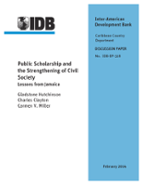Public Scholarship and the Strengthening of Civil Society: Lessons from Jamaica
Date
Feb 2014
This essay uses the context of the Inter-American Development Bank's (IDB) tripartite collaboration meetings between the Caribbean's civil society groups, governments and international development partners (IDPs) to discuss the role of public scholarship in a country's pursuit of modern development. We define public scholarship as collaborative knowledge-making with, for and about various publics and communities. It derives its importance from the appreciation that meeting the challenges of modern national development requires holistic, comprehensive and synergistic collaboration between differently-experienced and endowed stakeholders, and between formal disciplines and experiential knowledge and knowledge-makers. Its utilization encourages modern development thinking to reach beyond the wisdom of conventional thoughts and approaches, and to become grounded in societal issues such as justice, equity, democratic inclusiveness and community empowerment. This approach and framework are necessary if the aspirational goals of various publics and communities are to meaningfully influence national development in the face of internal dislocations resulting from the pressures of globalization, rapid technological change and demands for sustained improvements in citizens' well-being.



